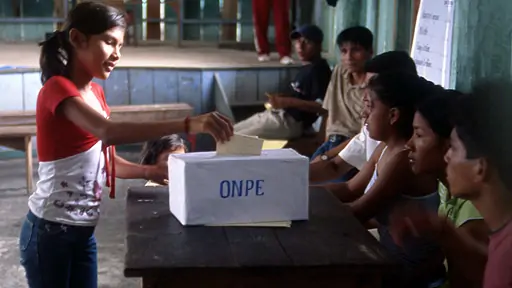Indigenous Calendar June, 2016: Cocama "Votey McVoteface" Democracy, Peru

Richard Dawkins is the most famous advocate of evolution since Charles Darwin. Forty years ago he published his seminal work, The Selfish Gene, which is still the most influential modern text on the subject. The Observer recently placed it in the 100 best non-fiction books of all time.
Noam Chomsky is the most famous linguist of all time. Writing just before Dawkins, he proposed that humans possess a species-unique outcome of evolution: the capacity for language. His work in linguistics is still the most influential on the subject. The Observer is still completing its list, but it is difficult to imagine that Chomsky will not appear on it eventually.
We know from carefully planned experiments and clinical case studies that the human brain evolved the capacity to delude itself. Both Dawkins and Chomsky have, in their later careers, turned their attention to the nature of that delusion. In Dawkins' case, his focus has been on the human brain's delusional belief in a Divine Creator. In Chomsky's case, his focus has been on the human brain's delusional belief that it lives in a democracy.
There is, of course, no logical contradiction between evolution and creationism. Yet, many creationists reject evolution a priori. This is because they do not — and often do not want to — understand science. Nor, often, do people want to understand what democracy is.
The United Kingdom is, politically, a monarchy-democracy hybrid. Dawkins and Chomsky, taken together, might suggest the unlikelihood that true democracy can be created there or anywhere else. This is popularly phrased by cynics and Anarchists as: "If voting changed anything it would be illegal." Later this month the United Kingdom will hold one of the most democratic of all political processes, a popular referendum. It is on whether to remain in the European Union.
It was once thought that the Internet would be a democratic platform — even that it might help to create democracy where democracy doesn't exist. We may conclude, from recent events in the United Kingdom, that the Internet can create anti-democracy. One of its government agencies recently held an open, online competition (a democratic referendum of sorts) to name a new scientific research ship. It was probably a tongue-in-cheek suggestion to name it "Boaty McBoatface." Yet, after that name received the most votes, the government chose a different name instead last month. "Democracy is Dead" read one headline. Whether in parody or solidarity, the concept has since gone viral. A racehorse has been renamed "Horsey McHorseface," a cheese product got the new name "Cheesy McCheeseface" and an entry in a competition to rename a school was "Schoolie McSchoolface." Even Google has gotten in on the act by releasing software called "Parsey McParseface."
Peru is, today, officially a democracy. During my first visit there I spent time in Cocama communities. This girl was one of the students taking part in a mock election to teach about democracy. The irony was not lost on me: Peru had greater democracy in pre-colonial times. The Peruvian people may think so too. In a recent election most eligible voters either did not bother voting or spoiled their ballot. There will be a runoff election there in a few days. Today, this girl is old enough to vote in that election. In recognition that her vote will not create real democracy in Peru, I propose that the eventual winner change their name to "Votey McVoteface" in acknowledgement that Peru will only learn what real democracy is from this girl's ancestors.
Read more about the Cocama People.
If you enjoyed reading this article, please consider supporting independent, advertising-free journalism by buying us a coffee to help us cover the cost of hosting our web site. Please click on the link or scan the QR code. Thanks!


